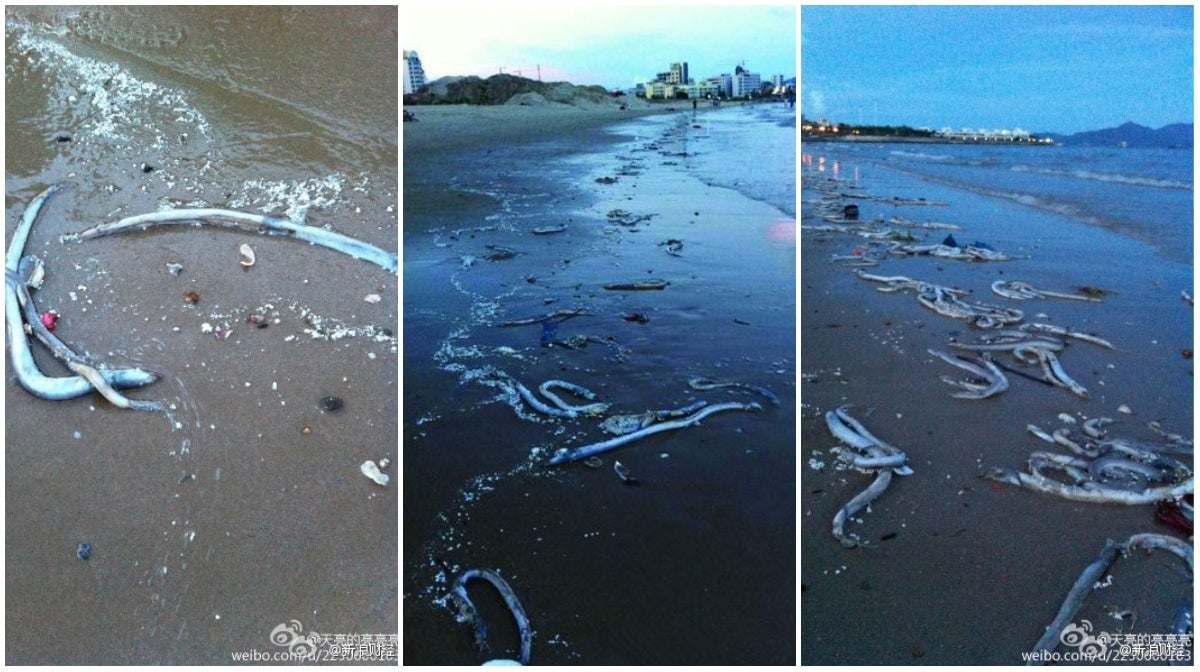What killed the tens of thousands of dead eels washing up on Guangdong beaches?
It’s already been a big year for mass animal death in China. So far we’ve had pigs, fish, ducks and swans.

It’s already been a big year for mass animal death in China. So far we’ve had pigs, fish, ducks and swans.
And now eels. Residents report that tens of thousands of them have washed up on the shores of Guangdong’s Huizhou, off Daya Bay, befouling the area with a noxious stench.
And like the other China faunapocalypses, this one’s a whodunnit.
The main suspect so far is a subsidiary of China National Offshore Oil Company (CNOOC), which is in the process of doubling its crude refinery production to 24 million barrels a day, reports South China Morning Post. However, the area is also home to Guangdong Nuclear Power Station, which produces some 50 tons of spent nuclear fuel each year.
But CNOOC data show that emissions and waste water have recently been lower than the legal limit (link in Chinese), reports China News Network. According to the report, scientists invited to monitor water levels each year from July to September have noted that cold water, low oxygen content and high salinity could have wiped out the eels.
Some Sina Weibo users were skeptical. “Every day the refinery reeks, and then [CNOOC] says that emissions are within the limit…its credibility is extremely low,” wrote a resident of nearby Shenzhen on Sina Weibo, while another nearby resident “grew faint” at the thought that his company’s cafeteria served fish every day. “Water quality is always within the standard. It’s kind of like how China has 40% of the world’s stomach cancer, but more than 90% of the food is ‘within the standard,'” wrote another. One Huizhou resident said fish wash up on the beach like this every year, though (all links in this paragraph in Chinese; registration required).
The eels may have died of natural causes. Either way, the government’s opacity has bred knee-jerk distrust among the Chinese public. One Weibo user voiced outrage that the local government’s Environmental Protection Bureau had “maintained silence.” As one user mused in response to the eel incident, “I know that China’s nuclear technology is good. But just in case, if there were a security accident, wouldn’t it be possible to promptly tell residents so that they might let people run for their lives?” (all links in this paragraph in Chinese; registration required).
The public has reason to be suspicious; government coverups of hazardous incidents aren’t uncommon. Guangzhou local officials were recently busted for failing to alert the public that huge quantities of the cities rice was infused with toxic metals.
Citizens are increasingly protesting to prioritize health and environmental standards over economic growth. Residents of Heshan, Guangdong province, just blocked the construction of a nuclear plant. And in May, Shanghai protests foiled plans for a battery factory.
But even as the economy slows, economic development still trumps citizens’ health concerns as often as not. Just ask Kunming residents. In May, tens of thousands protested a planned China National Petroleum Corp paraxylene plant. However, the latest propaganda efforts hint that the government seems bent on letting the state-owned petrochemical company push ahead with its refinery.